PTI wins 6 seats, opposition 5 in long-delayed Senate elections in Pakistan’s KP
Polling saw full turnout from KP’s 145-member assembly, with CM Gandapur casting the final vote
Kamran Ali
Correspondent Nukta
Kamran Ali, a seasoned journalist from Khyber Pakhtunkhwa, Pakistan, has a decade of experience covering terrorism, human rights, politics, economy, climate change, culture, and sports. With an MS in Media Studies, he has worked across print, radio, TV, and digital media, producing investigative reports and co-hosting shows that highlight critical issues.

AI illustration featuring a ballot box in the foreground against the backdrop of Senate proceedings.
Nukta
More than a year after being postponed due to a legal and political deadlock, Senate elections were finally held in Pakistan’s northwestern Khyber Pakhtunkhwa province, with the Pakistan Tehreek-e-Insaf (PTI) securing six of the 11 seats and the remaining five going to a joint opposition alliance.
The vote followed intense negotiations and a rare seat-sharing agreement between rival parties aimed at preventing horse-trading.
According to unofficial results:
PTI-backed candidates won four of the seven general seats:
- Murad Saeed
- Faisal Javed
- Noorul Haq Qadri
- Mirza Afridi
Opposition bloc comprising PML-N, PPP, and JUI-F secured the remaining three:
- Niaz Amir Muqam (PML-N)
- Maulana Attaul Haq Darwaish (JUI-F)
- Talha Mehmood (PPP)
On the reserved seats:
Women’s seats:
- Rubina Naz (PTI)
- Rubina Khalid (PPP)
Technocrat seats:
- Azam Swati (PTI)
- Dilawar Khan (JUI-F)
The polling took place with full participation from the 145-member provincial assembly — 92 from the government and 53 from the opposition — with Chief Minister Ali Amin Gandapur casting the final vote. At least 19 votes were needed to win a general seat.
The only disruption came from Khurram Zeeshan, a disgruntled PTI member who refused to withdraw from the contest despite internal party consensus. He received only one vote.
According to senior PTI leader Mushtaq Ghani, both the government and opposition had originally agreed to elect senators unopposed, but Zeeshan’s refusal to step down forced a poll. “A formula was in place -- six seats for the government, five for the opposition -- and consensus was reached not to vote for Khurram,” he told Nukta.
Zeeshan reportedly questioned the legitimacy of PTI’s candidate list, claiming it lacked approval from jailed party leader and former prime minister Imran Khan. Ghani rejected the claim, saying the list had Khan’s endorsement via the party’s political committee.
Dr. Ibad Ullah, Leader of the Opposition in the KP Assembly, credited all political parties for upholding their agreement and avoiding vote-buying, which has marred Senate elections in other provinces, including Punjab and Balochistan.
Newly elected PTI senator Noorul Haq Qadri said the party’s decision to cooperate with the opposition aimed to prevent manipulation. “My first words on the Senate floor will be: ‘Free Imran Khan’,” he declared.
Senator-elect Rubina Naz expressed her commitment to advancing women’s rights and tackling issues such as domestic violence through stronger legislation. “This role gives me a powerful platform to push for reforms,” she said.
JUI-F’s Maulana Attaul Haq Darwaish vowed to advocate for peace and employment in the province, citing Khyber Pakhtunkhwa’s history of violence and instability.
The Senate vote ends a year-long impasse that began in April 2024, when the elections were first postponed after lawmakers elected on reserved seats were prevented from taking their oaths in the assembly.
Last month, the Supreme Court ruled against PTI’s claim to these reserved seats and awarded them to the opposition instead — a verdict that sparked protests in the KP Assembly, where PTI lawmakers accused the speaker of blocking participation.
The deadlock was finally resolved just a day before the Senate vote, when the Peshawar High Court authorized the provincial governor to administer the oath to lawmakers elected on reserved seats for women and minorities. Although these members had been officially notified by the Election Commission of Pakistan weeks earlier, procedural delays in the assembly repeatedly stalled the oath-taking process.










Comments
See what people are discussing